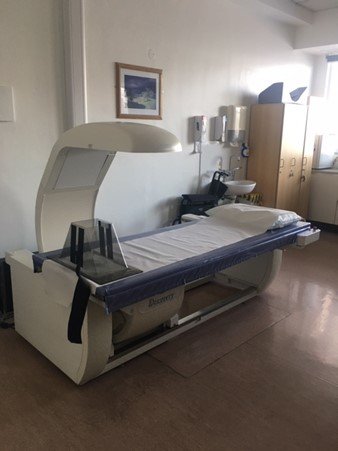DXA scans (Dual X-ray Absorptiometry) are used to aid in the diagnosis of osteoporosis (low bone density) in a wide range of patients. These include patients with fragility fractures, oncology patients on treatment that can affect bones, patients on long term steroids and patients with parental history of osteoporosis as well as children living with various conditions.

Three million people in the UK are living with osteoporosis, currently costing the NHS around £2 billion every year. The aim of diagnosing osteoporosis early is to treat the individual and to prevent fractures.
At CUH we have two DXA scanners and scan around 38 patients per day, usually hip and spine, as these are the locations most likely to fracture due to osteoporosis. We also perform forearm scans, whole body scans in children and vertebral morphometry to look for vertebral fractures.
Patients can be re-scanned after at least two years as bone turnover is fairly slow. A rate of change can then be acquired to see if treatment has improved the bone density or to check your levels have not decreased.
There are a range of treatments to help osteoporosis, comprising diet and exercise advice, tablets or infusions. Your referring clinician will advise on the best course of action if required.
Useful documents and websites
- Royal Osteoporosis Society - Osteoporosis: The Basics (opens in a new tab)
- CUH - DXA leaflet and certificate for paediatric patients
Further resources can be found on our Patient information A-Z.
For patients
You will receive an appointment letter through the post. If you are unable to attend the appointment please contact our bookings team, as advised in the letter, so that another appointment can be arranged.
On arrival, please check in at the Ultrasound reception and they will direct you to the DXA waiting area.
If you have mobility issues and may require a hoist, or are unable to lie mostly flat for the scan, please contact our bookings team. We are unable to scan anyone who arrives on a stretcher.
Hospital transport can only be provided if needed for medical reasons.
If you are a Cambridgeshire, Peterborough or Royston resident and require transport please contact EMED Patient Care on 0300 777 5555 to arrange transport. Please ensure a return journey is booked. Anyone outside of this area will need to contact your referring doctor or GP.
Your results will be sent to your referring clinician who will then contact you with any further action as necessary.

